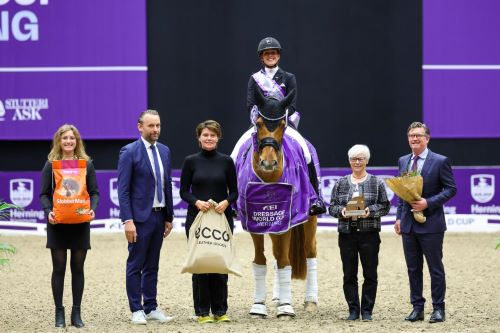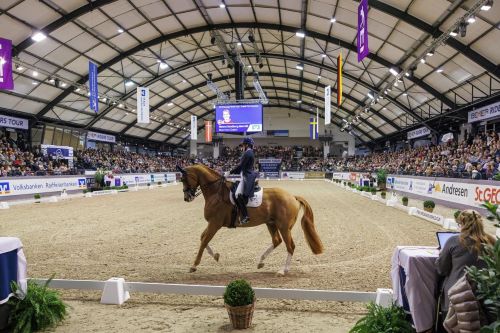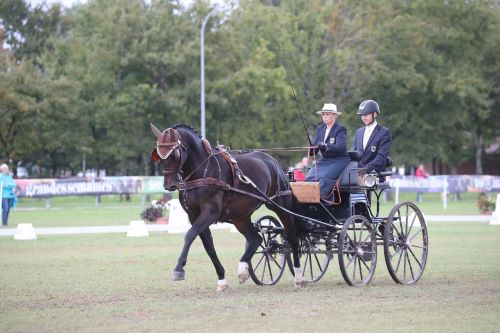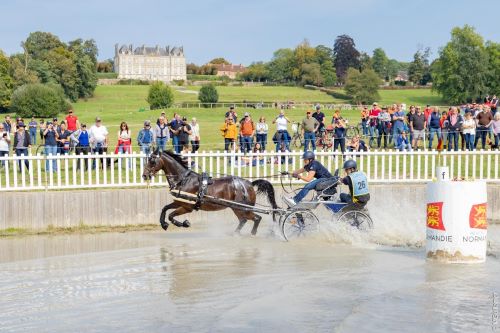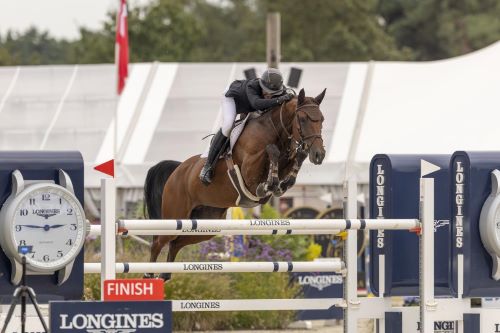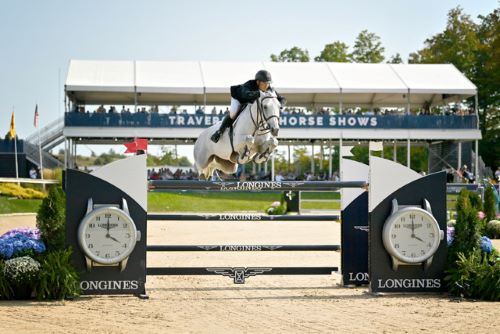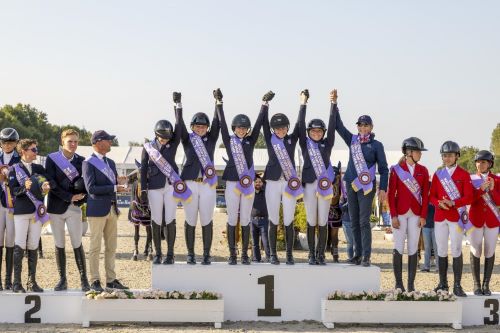Cathrine Laudrup-Dufour (DEN) and Mount St John ©FEI/Pernilla Hägg
On home soil in Denmark, Cathrine Laudrup-Dufour clinched a commanding victory with Mount St John Freestyle in the opening leg of the FEI Dressage World Cup™ 2024/2025 in the Western European League. Fellow Dane Daniel Bachmann Andersen and Vayron secured second place, while Sweden’s Maria von Essen prevented an all-Danish podium by finishing third with Invoice.
The Danish crowd came out in full force to support their home favourites, and they were not disappointed. In Friday’s Grand Prix, Mount St John Freestyle (owned by Laudrup-Dufour & Zinglersen Aps and Mount St John Equestrian LLP) captured the hearts of the audience and went on to deliver an even more stunning performance in the Freestyle. Scoring an impressive 88.965%, Laudrup-Dufour set a benchmark that no other competitor could match. “Already in the warm-up, she felt incredible. And Freestyle adored the arena,” said Laudrup-Dufour shortly after her ride.
Daniel Bachmann Andersen, teammate of Laudrup-Dufour in Denmark’s silver-medal-winning team at the Paris Olympics, guided the powerful Vayron (owned by the athlete and Rudolf Spiekermann) to second place with a score of 84.905%. These two combinations were the only ones to break the 80% barrier, setting themselves apart from the rest of the field. While their Paris teammate Nanna Skodborg Merrald initially claimed third place in the Grand Prix with Blue Hors Zepter (owned by Blue Hors Aps), some mistakes in their Freestyle dropped them to seventh place, opening the door for other competitors. Maria von Essen (SWE) seized that opportunity, moving up from seventh in the Grand Prix to third in the Freestyle with Invoice (owned by Alexanders Hovslageri & Häst Ab).
Cathrine Laudrup-Dufour and Mount St John Freestyle impressed at the Paris Olympics, finishing second in the Grand Prix and winning the Grand Prix Special. However, they slipped to fifth in the Freestyle. “Freestyle surprised me a bit in Paris. She was a little stressed from the prize-giving ceremony after the Grand Prix Special. Here in Herning, she was much calmer, as Cassidy did the prize-giving,” Laudrup-Dufour remarked.
Laudrup-Dufour’s Freestyle routine is technically demanding but also holds deep personal significance: “I love challenging myself. You need to stay sharp. For me, this is much more than just a floor plan and a piece of music. Every song and every movement remind me of something.”
As for the remainder of the FEI Dressage World Cup™ season, Laudrup-Dufour is still undecided. “I’ll make a plan with my trainer later. We’ve been invited to ride at the Top 10 in Stockholm, and after that, we’ll see.”
The five-member judging panel, consisting of Susanne Baarup (DEN), Kurt Christensen (DEN), Mariette Sanders-van Gansewinkel (NED), Alice Schwab (AUT), and Magnus Ringmark (SWE), unanimously placed Laudrup-Dufour at the top. They were equally unanimous in their decision to place Daniel Bachmann Andersen and his impressive bay Vayron in second.
Bachmann Andersen was delighted with his horse’s performance: “Vayron felt amazing in the warm-up already; he had much more focus than in the Grand Prix, where he was a little fresh, and I made a mistake in the tempi changes. Today he was more settled and focused. He is a very sensitive horse, but the more the audience applauds, the better he performs. His self-confidence was at its highest today. I feel he is really starting to believe in himself.”
Maria von Essen, riding Invoice, a horse she has had since he was two-and-a-half years old, claimed the third position. After winning the Grand Prix and finishing second in the Freestyle at last year’s FEI Dressage World Cup™ qualifier in Gothenburg, von Essen was pleased to secure a podium finish in Herning’s strong field. Starting sixth, she managed to hold on to a top-three spot. “My horse felt just amazing today; he really rose to the occasion,” said von Essen, who borrowed an old Freestyle routine from Cathrine Laudrup-Dufour, with whom she shares trainer Kyra Kyrklund.
The competition for the remaining top spots was intense. German athlete Bianca Nowag-Aulenbrock came closest to breaking into the top three, riding the cheerful mare Florine OLD (owned by Elisabeth von Wulffen) to a solid fourth place with a harmonious performance.
Lone Bang Zindorff, representing Denmark, secured fifth place with Thranegaardens Rostov (owned by Bang Dressage Aps), just ahead of Germany’s Carina Scholz and her experienced seventeen-year-old partner Tarantino (owned by Sportpferde Scholz). Nadja Aaboe Sloth (DEN) guided her own Favour Gersdorf to another score in the 78% range, joining Zindorff, Scholz, and Merrald in a closely contested battle for the top spots. Ninth and tenth places went to German athletes Raphael Netz with Great Escape Camelot and Ingrid Klimke with First Class.
by Bettine van Harselaar
